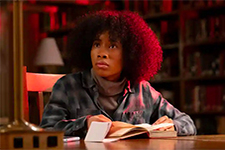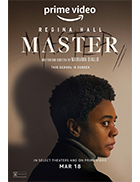Master
|  The title of Mariama Diallo’s Master has a sharp double edge. On the one hand, it refers to the prestigious position attained by one of the film’s protagonists, Gail Bishop, a black professor who is the first woman of color to be named “master” of one of the campus houses at the fictional Ancaster University. At the same time, though, the word can’t help but evoke the horrid history of chattel slavery, a time when Gail would have used that term to refer to the white men around her. Diallo, in her debut feature, has crafted a sharp drama about the residual, lingering specter of racism at the highest echelons of American society that is also a horror film, although the supernatural horrors don’t hold a candle to the real-life aggressions—micro and otherwise—that the film’s black characters must endure. The narrative involving Gail’s promotion to master and the tricky situation into which she is thrust as a member of the committee evaluating the tenure promotion of Liv Beckman (Amber Gray), another black female academic, is paralleled by the story of Jasmine Moore (Zoe Renee), a new freshman who quickly finds that being a student of color at a predominantly white institution puts more of a burden on her than she was expecting. Despite coming from a solid middle-class background where she attended a top private school and clearly lived much of her life surrounded by white folk, Jasmine nevertheless seems ill-prepared for just how deep the animosity toward her runs, particularly because it manifests in ways that make it difficult to determine if her fellow students are being intentionally racist or just blithely unaware of her experience (I would wager it is a little bit of both, sometimes within the same character). When she comes back to her dorm room one night to find her roommate Libby (Anna Van Patten) there with a group of her friends, they start trying to guess who Jasmine looks like, ticking off the usual roster of black celebrities whose only physical similarity to Jasmine is that they’re black. And then there’s the scene at a house party when all the white partygoers sing along to Sheck Wes’s “Mo Bamba” and don’t think twice about shouting along with the n-word. These overt expressions of hostility are matched constantly by a slow-burn sense of distance, where Jasmine is constantly made to feel different and excluded and put upon, including by Liv Backman, who clearly grades her writing harder because she expects Jasmine to share her ideological views. And that sense of being alone is Master’s most powerful emotional undercurrent. In virtually everything they do, Gail and Jasmine are alone in their parallel narratives, trying their best to navigate the tricky waters of being the lone person of color in the room. Gail must endure all manner of thoughtless asides and awkwardness from her liberal white colleagues, who conventional wisdom suggests are “allies” of people of color, but routinely reveal themselves to be ignorant in their own unique ways. Like Jordon Peele’s Get Out (2017), Master uses the horror genre to peel back the realities of racism in modern America, particularly within the rarefied world of the liberal upper crust, where post-racial bona fides are articulated with proud declarations that they would have voted for Barack Obama again if he had been able to run for a third term. Which reminds me—I haven’t really mentioned anything about Master’s explicit horror elements, and perhaps that is because they are the least interesting aspect of the film. Unlike Get Out, which so masterfully interwove its interpersonal drama about race with supernatural horror, those two components sometimes feel, if not at odds, at least not working fully in conjunction in Master. There is lingering backstory about a witch who was burned not too far from campus and may be haunting it to this day, as well as a legend about the room in which Jasmine is staying being cursed, which is possibly borne out by the fact that the university’s first black student hung herself in that very room. Diallo and cinematographer Charlotte Hornsby certainly know their way around dark corners, the creepiness of an empty university campus in the dead of night, and the slithering dread of something lurking under your bed, and in individual moments these elements work well enough. But, they never quite cohere with the film’s dramatization of unspoken racial tension, leaving them to run in parallel course. Master is still a deeply effective film, one in which black viewers will likely recognize a great deal of their own experience and one that white viewers should take to heart. Copyright © 2022 James Kendrick Thoughts? E-mail James Kendrick All images copyright © Amazon |
Overall Rating: 

 (3)
(3)


